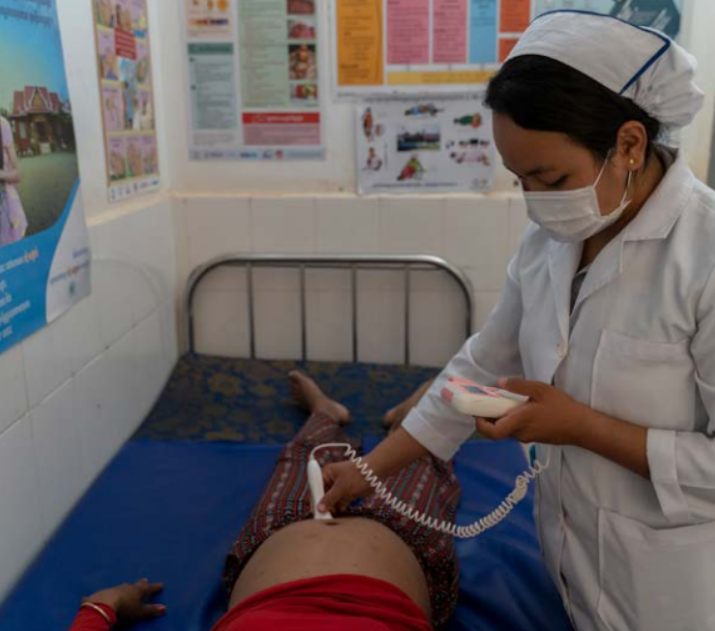.tmb-768v.png?Culture=en&sfvrsn=54737d84_1)
Strengthening early essential newborn care during COVID-19 in Cambodia
Author
World Health Organization
This action brief is extracted from the series of key action briefs on “maintaining the provision and use of services for maternal, newborn, child and adolescent health and older people during the COVID-19 pandemic” published by the WHO Department of Maternal, Newborn ,Child and Adolescent Health and Ageing. To access the series, please click here.
This brief was developed using information collected from existing documents as well as information captured through discussions with key institutional stakeholders. The views in this brief do not necessarily represent the decisions, policy or views of the World Health Organization.
Country
Cambodia
Key learning points
• At the national level, the Ministry of Health’ strong commitment to supporting the National Maternal and Child Health Centre to deliver essential services for mothers and newborns was a key to success.
• The availability of the Fast-track initiative road map for reducing maternal and newborn mortality (FTIRM), the National guidelines on Early Essential Newborn Care care and treatment, and the Five-year action plan for newborn care was critical to guide and advance implementation under the leadership of the National Maternal and Child Health Centre.
• Strong coordination mechanisms were in place at the national and provincial health departments (PHDs) as well as operational districts.
• The adoption of virtual training, coaching and monitoring helped to continue the capacity building effort, despite the COVID-19 outbreak was an important facilitating factor.
• The availability of data from the recently established DHIS2 was key, allowing provincial health departments and operating districts to closely monitor progress.
Background
Cambodia reached its Millennium Development Goals targets in 2015 for maternal mortality, neonatal mortality, and other main maternal, newborn, and child health indicators. To continue the work beyond 2015, The Fast-track initiative road map for reducing maternal and newborn mortality (FTIRM) which was introduced in 2010, was extended into Phase 2, aligned with the Five-year action plan for newborn care. Several newborn activities took place under the FTIRM, including coaching of health workers on immediate newborn care and scaling it up in all public health facilities in the country, introducing quality improvement (QI) for newborn care, establishment of multi-disciplinary hospital core teams (HCTs) at the provincial hospitals to routinely monitor and support QI of early essential newborn (EENC) care, and setting up specific EENC data collection of detailed indicators for measuring the trend of newborn care in all 27 hospitals across the country.
Impact of COVID-19 on newborn services
The COVID-19 pandemic was first identified in Cambodia in March 2020. Initially, no impact was noted on the delivery and use of newborn services until the beginning of the second quarter of 2021. Service provision for newborns was affected as a proportion of the staff were re-assigned to support the country’s COVID-19 vaccination effort. In addition, in several facilities staff were infected with the virus. Fear of the pandemic and unwillingness to approach health facilities among the general population, including pregnant women and mothers, resulted in low access to essential health care services.
What was the intervention or activity?
Several activities for strengthening and scaling-up the EENC were successfully implemented in 2021 despite the pandemic. The priority actions taken by the Ministry of Health and activities conducted during COVID-19 pandemic include:
1. EENC-QI coaching for provincial HCTs: Four provincial hospitals in Kandal, Kep, Mondulkiri, Steng Treng, and one municipal hospital in Phnom Penh received coaching to set up EENC HCTs to support the Five-year action plan for newborns. The process was led by four national facilitators experienced in EENC-QI coaching.
2. Training of trainers on intrapartum and immediate newborn care: A training of trainers was organized with a focus on intrapartum and immediate newborn care.
3. Assessment of readiness of facilities to introduce and support Kangaroo Mother Care: Assessments were conducted in the five provincial hospitals from October to December 2020 to determine the readiness of facilities to introduce and support KMC clinical practice.
4. Kangaroo Mother Care clinical coaching: Based on the findings of the assessment, KMC clinical coaching was provided to the health workers at the maternity wards and neonatal care units in the five provincial hospitals in 2021.
5. Review of the existing clinical guideline on Integrated Management of Childhood Illness for children from birth to 2 months.

Outcome of the implementation of the scale-up and strengthening of EENC during COVID-19
Results from the above-mentioned activities include the expansion of the Hospital Core Teams which are now functioning in all 25 hospitals to support QI of routine childbirth and newborn care. As a result of targeted coaching and EENC training, the HCT members are able to effectively implement EENC, track progress, identify and solve related problems. Through assessment and Kangaroo Mother Care coaching. Staff capacity has been upgraded on aspects linked to special care for babies born by caesarean section, and preterm and low birthweight babies.


